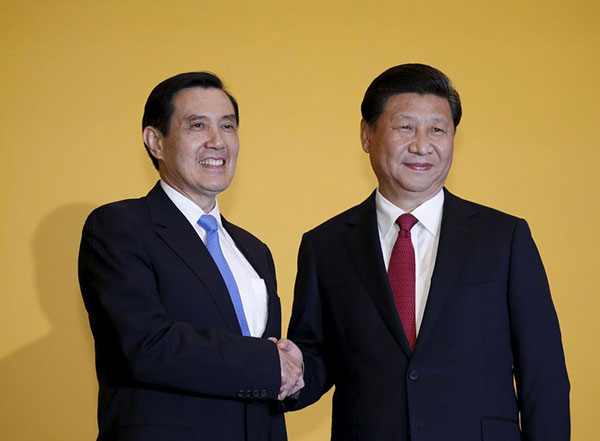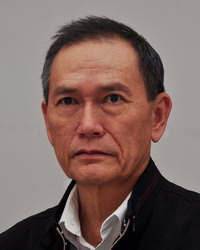Mainland-Taiwan reconciliation – A handshake that was 66 years late
Updated: 2015-11-09 15:52
By Chua Chin Leng(chinadaily.com.cn)
|
|||||||||||
 |
|
Xi Jinping and Ma Ying-jeou shook hands on Saturday afternoon in Singapore in the first meeting between leaders of the two sides of the Taiwan Straits since 1949, opening up a historic page in cross-Straits relations. [Photo/Agencies] |
What was meant to be a private meeting between the leaders of China and Taiwan turned out to be the main event on President Xi Jinping's agenda during his official state visit to Singapore. There were many agreements and MOUs to sign at the Istana between Singapore and China, speeches at NUS and other programs, but all turned out to be sideshows. More than 600 media representatives congregated at the Shangri-La Hotel in eager anticipation of something big or that at least a historic event would unfold after the meeting which they would not want to miss.
The Chinese mainland and Taiwan were technically still at war after the KMT government fled the mainland after a long fought civil war. No peace agreement was signed since that eventful day in 1949 and both sides were officially not on speaking terms, diplomatically. A meeting of the two leaders was not on the diplomatic agenda despite the strong and multi faceted relations between the people on both sides of the Taiwan Straits. The mainland is the biggest trading partner for Taiwan and the growth engine driving Taiwan's economy. But the leaders are not meant to be speaking to each other in public or in an official capacity.
 |
|
Chua Chin Leng[Photo provided to chinadaily.com.cn] |
Earlier media reports on the meeting between Ma and Xi said it was supposed to be a private affair and no press statement was expected from the meeting. The dramatic turn of events when both leaders appeared shaking hands in front of the media of the world, giving off their warmest handshakes and smiles were signs that the meeting went off very well, or at least better than expected.
The 66-years-late handshake was followed by a press conference held separately by the mainland and Taiwan. In the case of the mainland, only 3 questions were accepted and the press conference ended quickly. In the case of Taiwan, it was like the mainland acquiescing to Taiwan's request for more space in the world stage, a full panel of officials led by Ma Ying-jeou faced the media and took more than a dozen questions from the crowded floor.
What was significant in this meeting was the sincerity and accommodating spirits of both sides to move forward and pave the way for closer cooperation and reconciliation. The only principle that the mainland held to, which was shared by Taiwan is that there is one China as agreed in the 1992 Communique. The mood was positive and earnest and the mainland made several concessions and goodwill gestures to accommodate Taiwan both in creating space and also in welcoming Taiwan to participate in joint ventures and other Chinese initiatives.
The mainland now welcomes Taiwan's membership in the AIIB that it objected to earlier. Taiwan is also welcome to participate in the New Silk Road project. A hot line would be established for the two sides and more space for Taiwan on the international scene as long as the One China Principle is abided to.
Ma Ying-jeou got his assurance from the mainland that both sides would pursue peace and stability through negotiation and to cooperate for the future generations of the Chinese civilization on both sides of the Straits. The press conferences were testimonies that both the mainland and Taiwan are positive about moving forward together under the One China Principle. Though reunification was still an issue left to future generations, there is at least some closure and assurance that there are common grounds and objectives to work together for the good of Chinese civilization.
The Chinese mainland and Taiwan are one family. The two siblings have agreed to remove the hostilities of the past and to sit together for a meal and to work together as members of a family. The cordiality and optimism of both leaders could not be missed by all present at the press conferences and both leaders would return home with a sense of achievement that this is another milestone in the reconciliation process.
It was a story with a good ending.
The author, Chua Chin Leng, is a political observer from Singapore.
Related Stories
Leaders across Taiwan Straits meet for first time in 66 years 2015-11-07 19:35
Xi: Taiwan Straits' relations at a crossroad 2015-11-07 16:09
More Taiwan students studying in mainland universities 2015-11-06 20:10
Taiwan leader says it's his duty to 'build a bridge' 2015-11-06 07:50
Singapore plays positive role in ties with Taiwan 2015-11-05 09:27
Taiwan voices high expectation for upcoming Xi-Ma meeting 2015-11-04 22:16
Today's Top News
Two pandas moving to Dutch zoo from China
UK unveils new spying powers, raising privacy fears
UN chief commends efforts by China, France to push for climate pact
China and Europe to jointly fund scientific research and innovation
Merkel calls for European solution to refugee crisis
China, France made progress in nuclear energy cooperation
More than 100 UK investment projects revealed
Hollande highlights green growth during visit
Hot Topics
Lunar probe , China growth forecasts, Emission rules get tougher, China seen through 'colored lens', International board,
Editor's Picks

|

|

|

|

|

|






